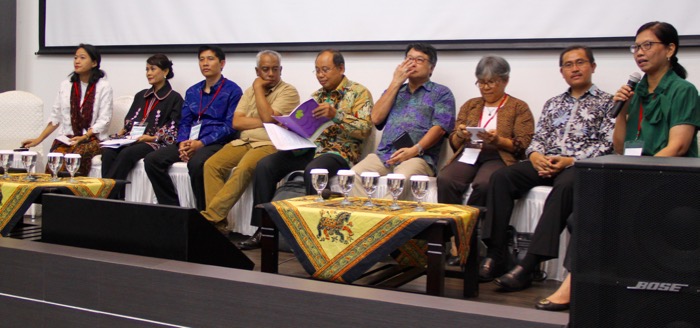IARJAsia: Getting Religion Right—the challenges of covering minority religions

JAKARTA, Indonesia—Accurate reporting on minority religions is sorely lacking, said journalists participating in a panel at the global conference of the International Association of Religion Journalists (IARJ).
Indonesia has the world’s largest Muslim population, more than 200 million. (Pakistan is a close second in Muslim population.) However, there are many other faith groups within Indonesia’s vast archipelago. In the 2010 Indonesian census, 87% of Indonesians identified themselves as Muslim (with Sunnis more than 99%, Shias 0.5% and Ahmadis 0.2%), 7% Protestant, 3% Catholic, 2% Hindu, 1% Buddhist, 0.05% Confucian and 0.5% gave other responses including “other” or “nothing.”
The Rev. Henrietta Tabita Lebang, Chair of the Indonesian Communion of Churches, said she was not only perplexed by the consistent favoring of Catholic over Protestant Christian stories and photos in the press, even on major holidays like Easter and Christmas, but she was also frustrated by the failure to report on significant interfaith activities taking place in Indonesia.
Reporting on minority faiths is so problematic in Indonesia that many Catholics are hesitant to appear in the press. We, the Catholics, would be happier if there were no news about Catholics at all,
said interfaith activist Johannes Haryanto.
Muhsin Labib, representative from the Ahlul Bait Indonesia, expressed deep concern about the poor treatment of the 1 million Shia Muslims in Indonesia, who have been subject to attacks, particularly in 2008. He indicated that the coverage of Shia issues is often seen through a Sunni lens, which is prejudiced and unsympathetic. At its worst, Labib mentioned inaccurate and hostile rumors about Shia communities that occasionally appear online and can incite hatred and even physical attacks. More accurate, informative journalism is needed, Labib said.
This is also true of the 400,000 Ahmadiyas—a movement that emerged within Islam in the late 1800s and continues to be a center of controversy in predominantly Muslim countries. Yendra Budlan, spokesperson for Jamaah Ahmadiyah Indonesia pointed out the consistent misrepresentation of the faith in the press.
Smaller groups, such as the Baha’is, struggle for a place in the media, even though their representatives argue that they have a positive message and welcoming attitude that should be considered good news.
On the other hand, Dewi Kanti, spokesperson for the indigenous Sunda Wiwitan indicated that the media was simply unaware of religion stories because of the generally secular background and world view of journalists. For example, the expropriation of Sunda Wiwitan land has profound spiritual significance for them, as it is deeply connected to their identity, culture and traditions.
The general observation shared by all the panelists was that journalists often miss the real stories due to a lack of knowledge and a reluctance to ask representatives of faith groups for clarification and to participate in fact checking.
Overall, the panelists called on journalists to dig deeper to learn more about the groups on which they are reporting.
The panelist’s strongest appeal was for journalists to realize that a focus on the six faiths officially recognized in Indonesia’s constitution (Islam, Christianity, Hinduism, Buddhism and Confucianism) ignores the multitude of other religious groups in this nation that by sheer land mass is the world’s seventh largest country.
Panelists called on journalists to explore other faiths that rarely are featured in news media, including the tradition of Javanese beliefs known as Kebatinan.
The panel’s diverse and thoughtful interaction with journalists primarily from Asia, and also IARJ representatives around the world, illustrated why it is so important to have organized this global conference in one of the world’s most ethnically, linguistically, culturally and religiously diverse countries.
Rachael Kohn is founder and voice of The Spirit of Things, Australia’s go-to program on the ABC Radio National (RN) for in depth stories about the role of religion in society, the arts, community relations and personal life.
Care to read more?
If you share this news with others on social media, please use the hashtag #IARJAsia
Follow us on Twitter for live updates from the conference—and, after the conference, ongoing Twitter notes about important issues and examples of reporting on religion.
